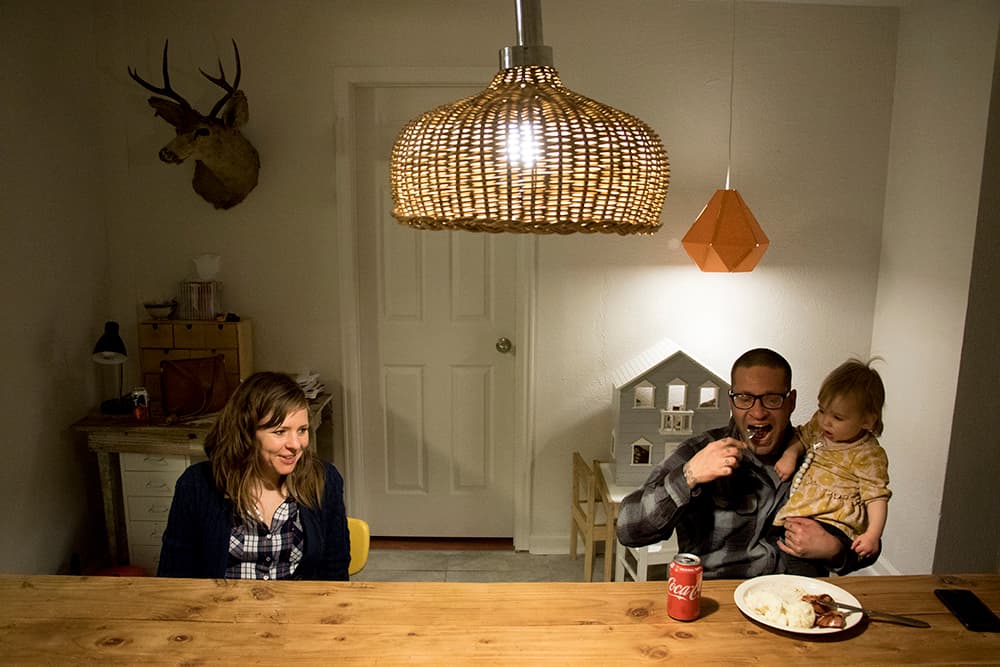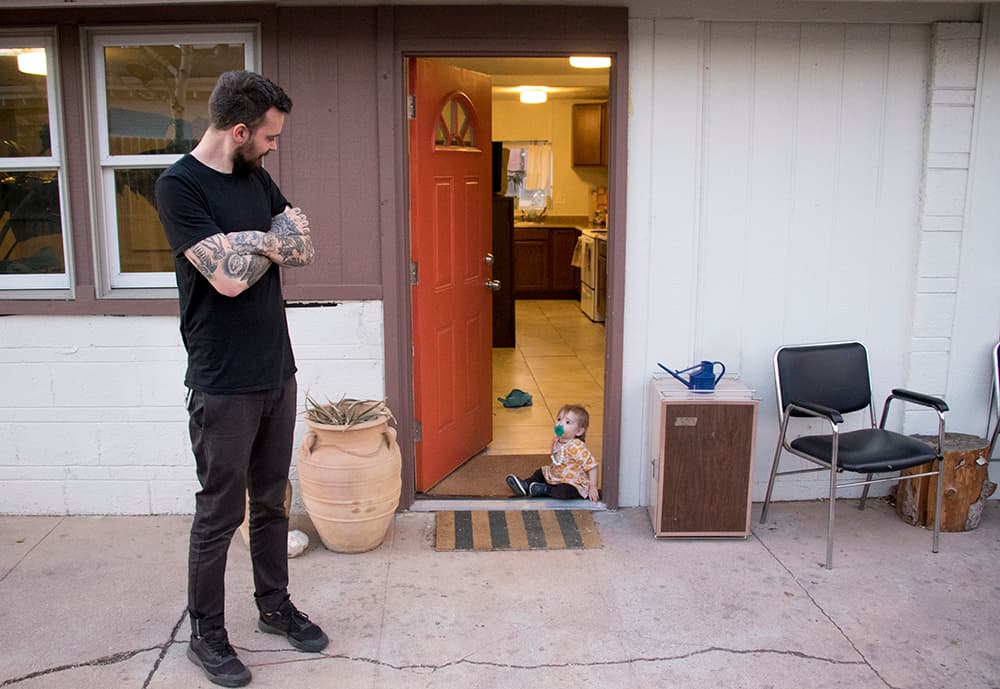
John Hyde comes to the door in his usual all-black outfit, baby Ruby in the crook of his tattooed left arm. The house looks a little unusual -- an oversized cinderblock rectangle that used to be a daycare -- but, as of last year, he and his wife have called it their own: their big geometric painting, their stuffed coyote, their toddler's play-kitchen. Their home.
Except it's not theirs -- not entirely, anyway. They're part of the home-sharing movement, an effort to create affordable housing by opening up private homes to renters who have few other options.
"We specifically rent out rooms in our house to people in the community at below market rate," explained Hyde, 31, a print shop employee. "That is a way that I see me redeeming the fact that I’m a clichéd white, cis-gendered homeowner. That is my justification to be a white homeowner in a gentrifying neighborhood."
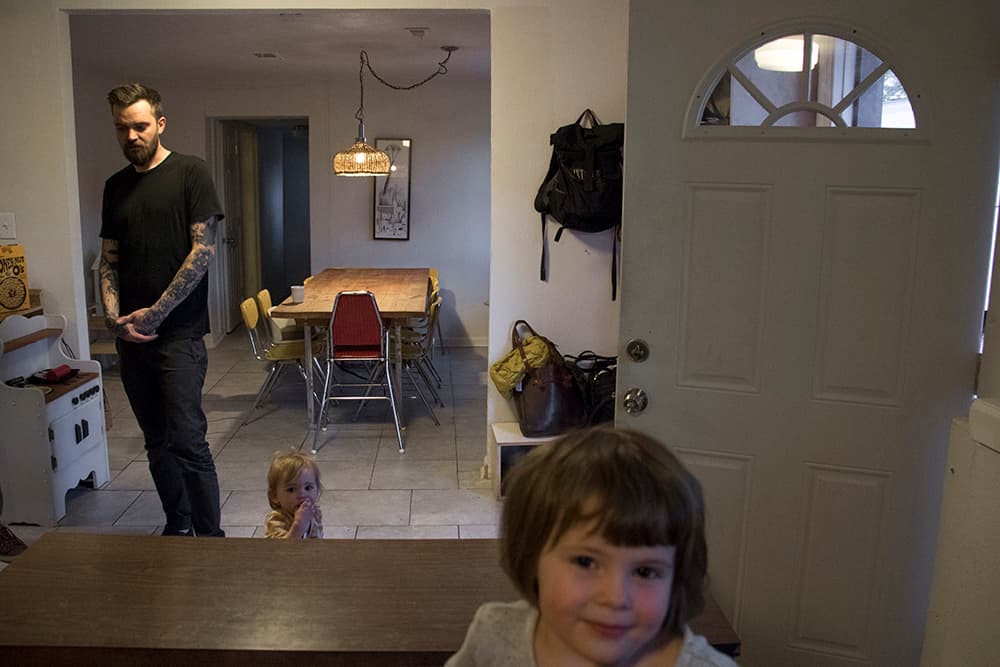
It started for the Hydes as an effort to live "in community" -- a popular concept among young churchgoers. "What would happen if we had a grown-up punk house?" explained Kimberly Hyde, sitting at their extra-long dining-room table.
Over the years, they've hosted ceramicists, leather workers, jewelers, coffee roasters, illustrators and others. They were so good at choosing roomies that their friends started "stealing" their tenants. At the same time, though, they wondered if they were sharing enough of their blessings.
John and Kimberly had long thought about the "social implications of religion," according to John's younger brother, Marcus Hyde. Marcus for years lived at Denver's Catholic Worker's House, a refuge for people experiencing homelessness and others practicing voluntary poverty, with the idea of finding God in other people.
At their new home in Northeast Park Hill, John and Kimberly wondered whether they could live out a similar idea within the confines of parenthood and homeownership.
"What if we didn’t live with privileged, white monoculture people? I think we can handle branching out," Kimberly Hyde said.
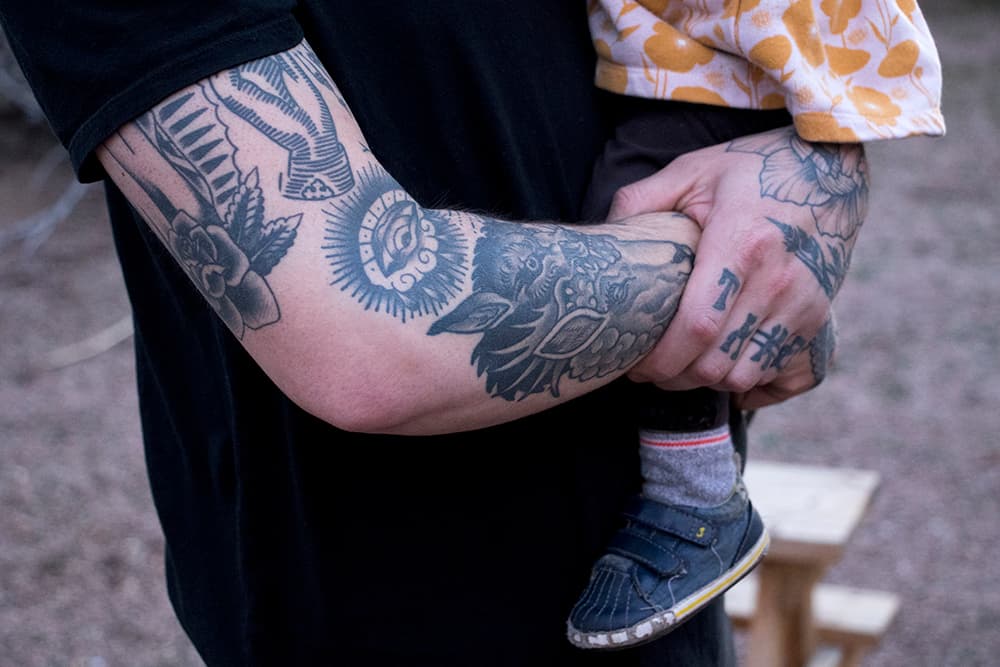
They found their chance late last year.
Their evangelical community, Providence Bible Church, had launched a "HomeShare" program.
“It’s sort of like eHarmony for affordable housing,” said Taylor Schultz, an organizer of the program.
They're trying to tap some 150,000 bedrooms that are going vacant in the city, making them available to people who are "already taking steps towards self-sufficiency but just need a stable foundation to help them grow and flourish," according to Schultz.
The program has made three matches in its first six months, with five more in the works. Groups such as CrossPurpose and Purple Door Coffee are referring home-seekers to the program, while real-estate investors also are starting to offer up vacant homes.
A different program, Sunshine Home Share Colorado, uses the same model to help older people stay in their homes. It's an idea gaining enough interest that it could be included in an update of Denver's laws.
The Hydes' match was a man named John Muir.
Muir is, as the story goes, the second great-nephew of the legendary American naturalist who shares his name.
He doesn't look much different from John Hyde, though he's a few inches shorter. He also attends Providence. He also has tattoos -- "GOOD" and "EVIL" on his knuckles, a cross inked on his throat with the word "Redemption."
Some of Muir's tattoos, though, are remnants of his old life.
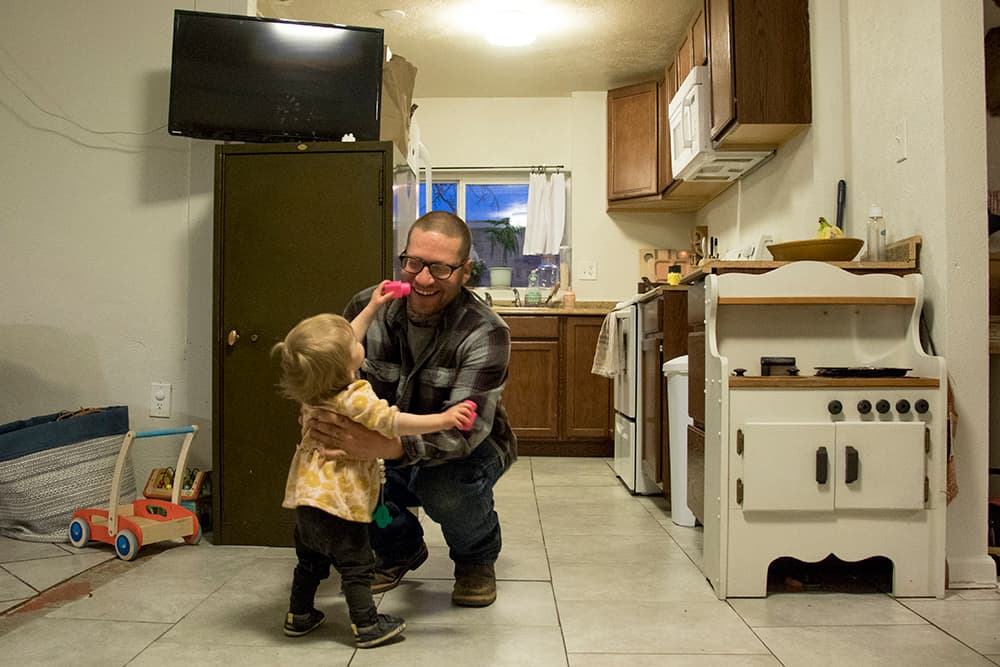
"I was locked up most of my life as a teenager," said Muir, 34. More recently, he pleaded guilty in 2014 to a felony charge related to the theft of guns and jewelry, according to public records.
Leaving jail on a plea bargain, he found himself sober, a recently converted Christian, and utterly adrift in his home state of Colorado.
"My felonies were preventing me from finding a place," he explained, sitting on a bench at the Clayton Early Learning campus not far from his new home.
"Before, I always had my own place. I never had to struggle until I actually became a legitimate person -- until I stopped selling drugs or doing certain things," he said.
He moved in with the Hydes at the beginning of 2018.
Meanwhile, in Aurora, another set of new roommates was getting introduced.
Dottie and David Wire, a retired couple, had spent some 20 years as missionaries in Senegal, where they saw a culture that they described as more communal than America's. Returning home, they found themselves at a disconnect with other people's ideas of good works.
"We have seen churches where they can relate and give money and do stuff for people in Africa ... but they don’t know anything about the people down the road," said Dottie Wire, 68.
"Eveyone’s all excited about what you’re doing. 'God’s changing lives.' And Dave said, 'How many of you know anyone in Andersonville?" she added, referring to an area of Fort Collins.
They, too, found Providence, and eventually were matched with Monica, a young mother of three.
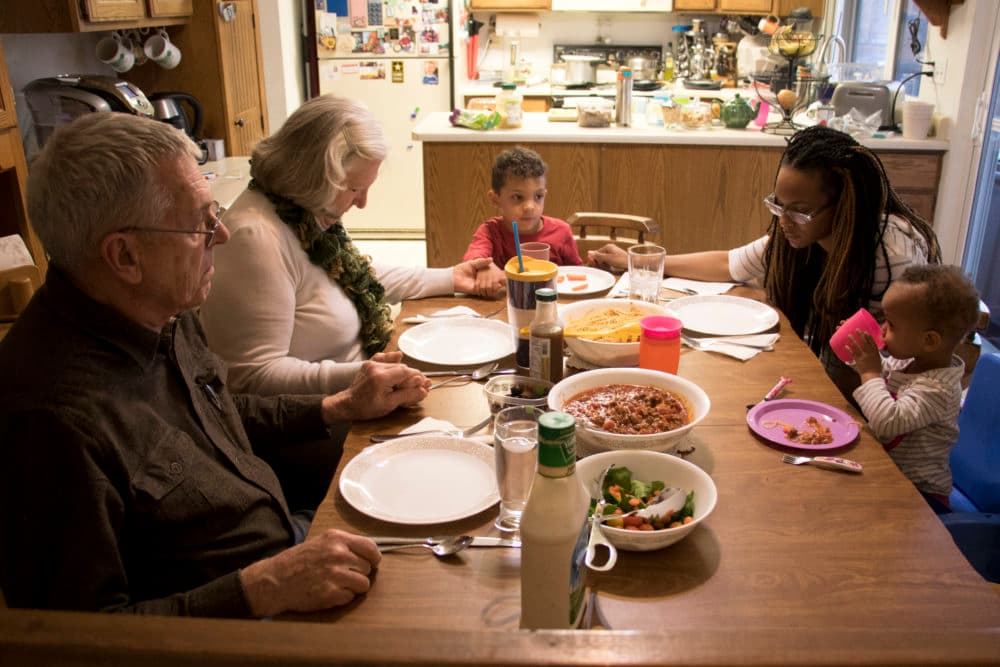
In one sense, this is all completely normal. It's called "having roommates."
And, to be clear, the homeowners don't think that what they're doing is charity -- just decency.
But, in some senses, it's a radical act.
For one thing, people tend to self-segregate. For example, a recent study found that black people in three cities faced "very high levels of discrimination" in seeking rooms on Craigslist, receiving far fewer responses than white candidates.
There's also the impersonal discrimination of "the market." The Hydes are charging $450 a month for their home-share room, while comparable rooms were running for $800 or more, according to Muir. The Wires also have set their rent far below market rate, they said. (On a check of Craigslist, I could hardly find a legitimate listing for less than $700.)
Providence HomeShare tries to ease the anxieties of crossing these social divides, for homeowners and home-seekers alike. Their process includes supervised home visits; custom leases and contracts; and regular check-ins with staff.
"I asked other people: Would you totally trust your kids with him?" Kimberly Hyde said of Muir.
The program's staff helped the Hydes set simple expectations about cleanliness and common spaces. The Wires also have rules against drinking and extra-marital relations in the house, but they say they don't mind what happens outside their doors.
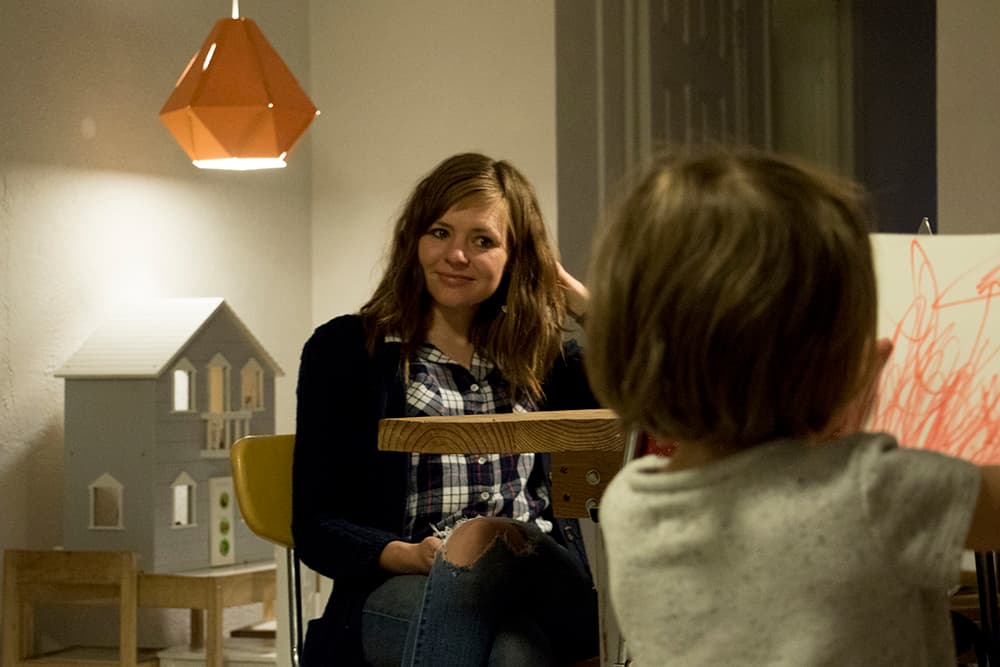
Their new roommate, meanwhile, stepped gingerly.
"I think he was timid at first, he would ask for permission for everything, to use a dish," she recalled. "We said 'Please, use a dish. This is your home.'"
Muir, meanwhile, said that he worried at first about who he could be matched with -- but their connection through church made it easier. (However, Providence does not require participants to attend church, nor does it aim to "save souls," Schultz said.)
Muir first felt at home as he sat with the Hydes and their roommates to play boardgames at the dining room table. It was something he'd never done as a kid.
"I didn't know what normal felt like, so it was totally weird," he said. "Normal for me is watching your back, drinking, selling drugs, partying, fights, ripping people off, stuff like that. That was normal to me. Normal to me is not normal to you, I guess. And that’s slowly changing."
One night this week, arriving home tired and dirty from his landscaping job, he seemed almost like a long-lost uncle. Fowler, the toddler, immediately demanded his attention. He lifted Ruby, the baby, up into the air for a moment.
He looked at home, even if he couldn't remember the kind of childhood these kids are having. Out in Aurora, the Wires are having a mirror experience: Monica's kids are already calling them Grams and Grampa, with Monica's permission.
And the connection, they said, is just as important to them as it is to their new roommate.
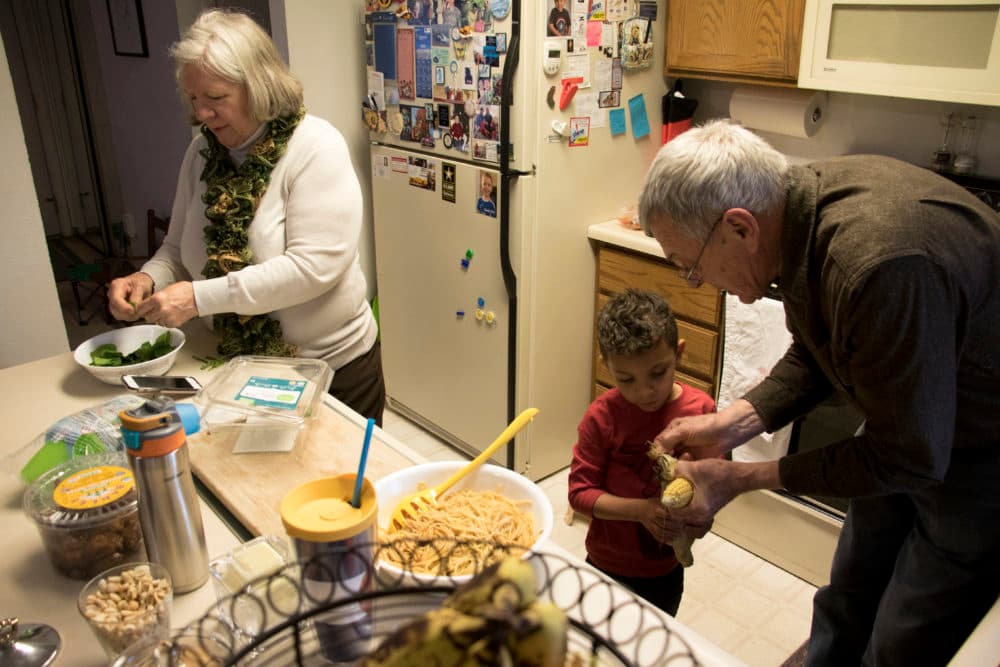
"I don’t want to be independent, because I'm a human being who needs human beings. I don’t want to be dependent, in that somebody else takes care of me," said David Wire, 76. "Being interdependent, that’s what we do for one another."
Muir, who is in school to become a veterinary assistant, sees the same desire in the Hydes.
"They want a sense of community just as bad as I do," he said. "There’s a lot of people who want community — but how willing are they going to be to get it?"
